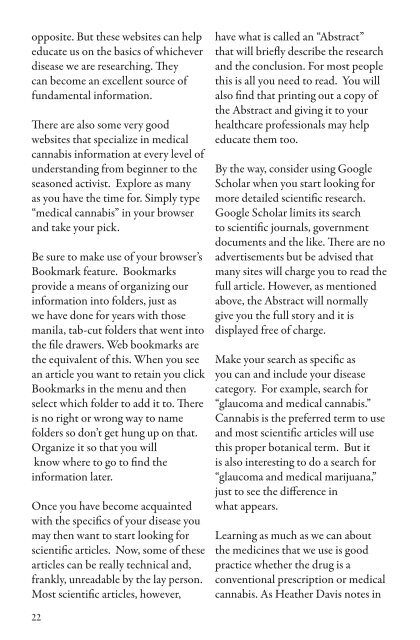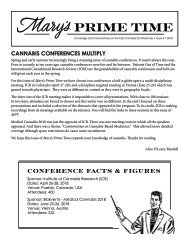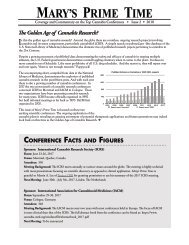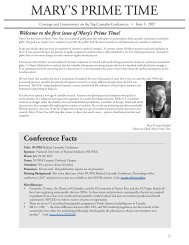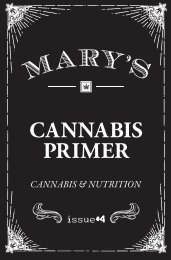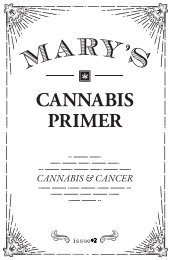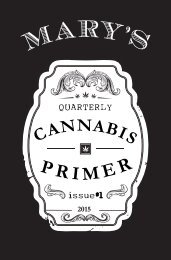#3: The Endocannabinoid System
Mary's Cannabis Primer is published as a resource for national and international education about the benefits of Cannabis. This issue focuses on the science of the Endocannabinoid System, and how THC affects the brain and the body.
Mary's Cannabis Primer is published as a resource for national and international education about the benefits of Cannabis. This issue focuses on the science of the Endocannabinoid System, and how THC affects the brain and the body.
Create successful ePaper yourself
Turn your PDF publications into a flip-book with our unique Google optimized e-Paper software.
opposite. But these websites can help<br />
educate us on the basics of whichever<br />
disease we are researching. <strong>The</strong>y<br />
can become an excellent source of<br />
fundamental information.<br />
<strong>The</strong>re are also some very good<br />
websites that specialize in medical<br />
cannabis information at every level of<br />
understanding from beginner to the<br />
seasoned activist. Explore as many<br />
as you have the time for. Simply type<br />
“medical cannabis” in your browser<br />
and take your pick.<br />
Be sure to make use of your browser’s<br />
Bookmark feature. Bookmarks<br />
provide a means of organizing our<br />
information into folders, just as<br />
we have done for years with those<br />
manila, tab-cut folders that went into<br />
the file drawers. Web bookmarks are<br />
the equivalent of this. When you see<br />
an article you want to retain you click<br />
Bookmarks in the menu and then<br />
select which folder to add it to. <strong>The</strong>re<br />
is no right or wrong way to name<br />
folders so don’t get hung up on that.<br />
Organize it so that you will<br />
know where to go to find the<br />
information later.<br />
Once you have become acquainted<br />
with the specifics of your disease you<br />
may then want to start looking for<br />
scientific articles. Now, some of these<br />
articles can be really technical and,<br />
frankly, unreadable by the lay person.<br />
Most scientific articles, however,<br />
have what is called an “Abstract”<br />
that will briefly describe the research<br />
and the conclusion. For most people<br />
this is all you need to read. You will<br />
also find that printing out a copy of<br />
the Abstract and giving it to your<br />
healthcare professionals may help<br />
educate them too.<br />
By the way, consider using Google<br />
Scholar when you start looking for<br />
more detailed scientific research.<br />
Google Scholar limits its search<br />
to scientific journals, government<br />
documents and the like. <strong>The</strong>re are no<br />
advertisements but be advised that<br />
many sites will charge you to read the<br />
full article. However, as mentioned<br />
above, the Abstract will normally<br />
give you the full story and it is<br />
displayed free of charge.<br />
Make your search as specific as<br />
you can and include your disease<br />
category. For example, search for<br />
“glaucoma and medical cannabis.”<br />
Cannabis is the preferred term to use<br />
and most scientific articles will use<br />
this proper botanical term. But it<br />
is also interesting to do a search for<br />
“glaucoma and medical marijuana,”<br />
just to see the difference in<br />
what appears.<br />
Learning as much as we can about<br />
the medicines that we use is good<br />
practice whether the drug is a<br />
conventional prescription or medical<br />
cannabis. As Heather Davis notes in<br />
22


